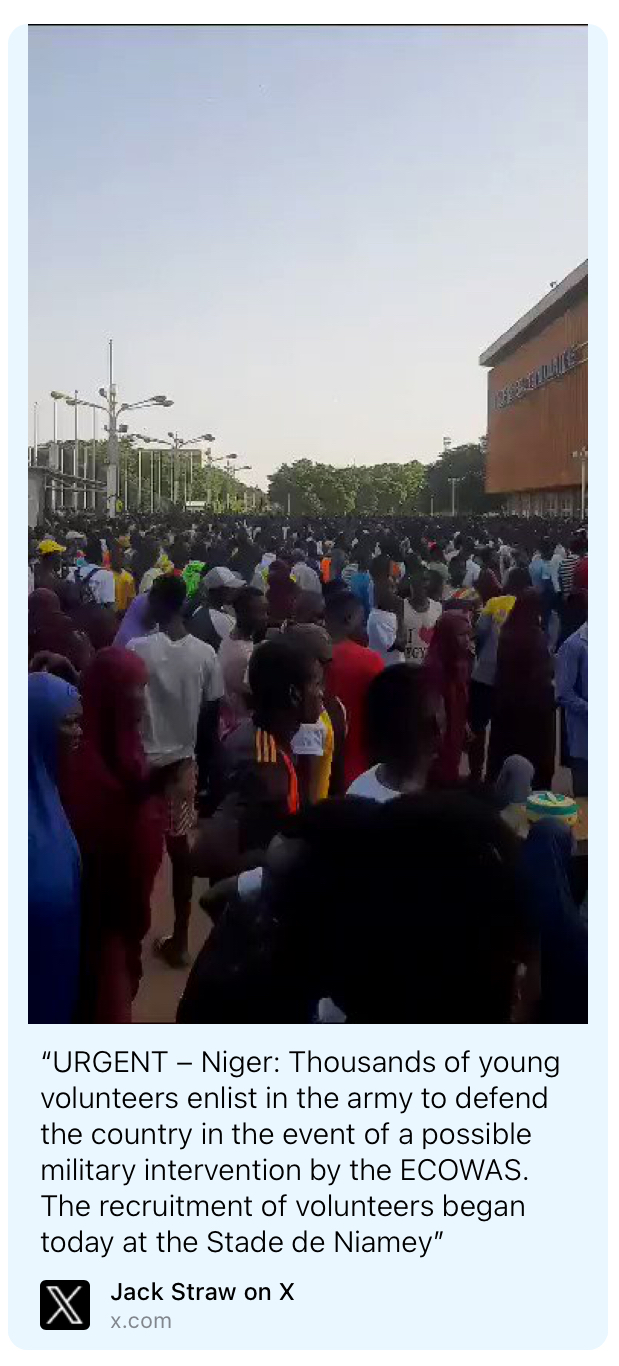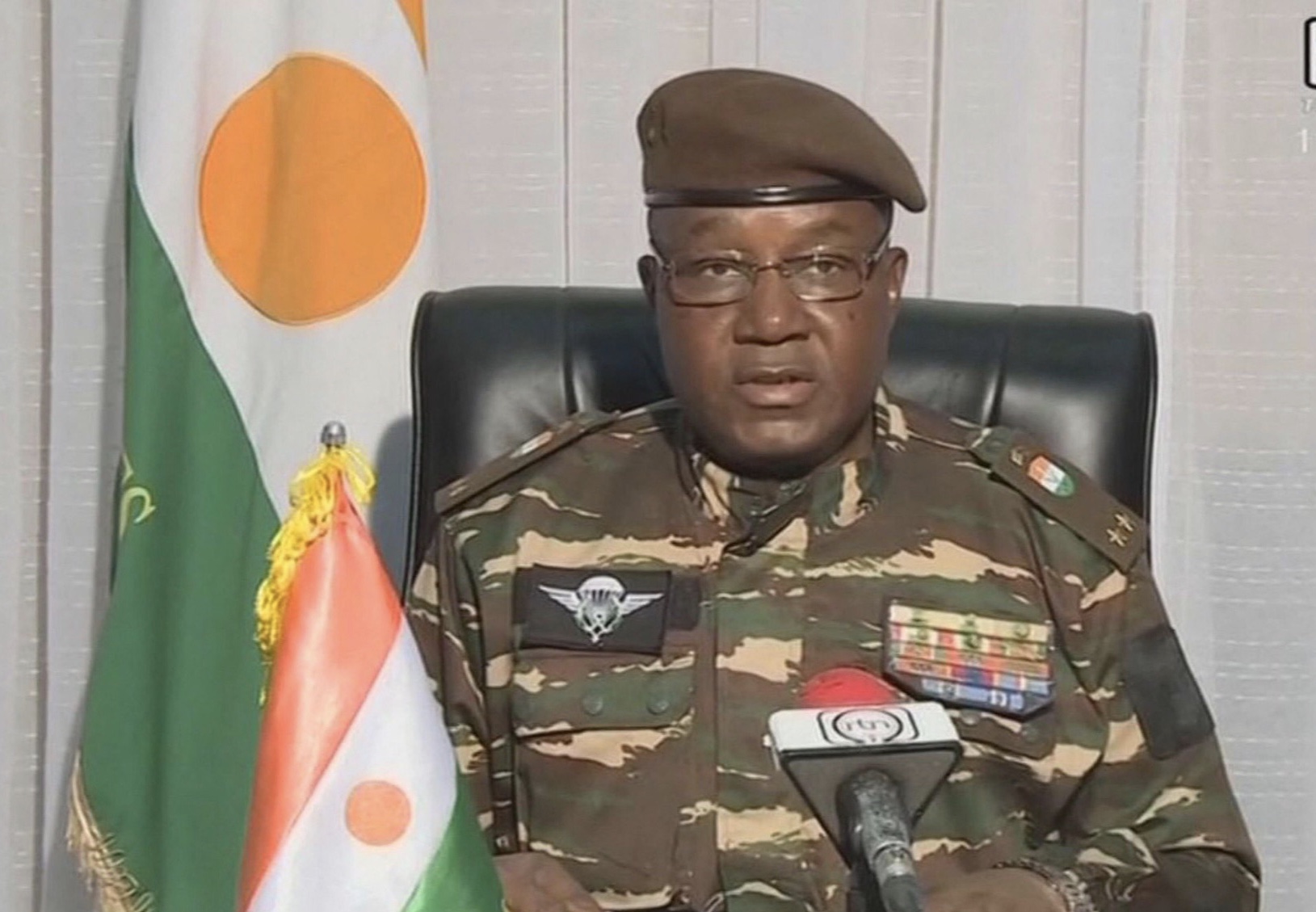Defence chiefs and Generals from 11 West African member states of the regional bloc, ECOWAS, met at a summit in Ghana at the end of this week and declared their military forces to be in a state of readiness to invade Niger. The gathering of West African top military brass, pledged their commitment to deploying an invasion force to restore to power the deposed President of Niger Mohamed Bazoum. In their own words, they stated their purpose was ‘to restore democracy in Niger’. This new resolve came after Mohamed Bazoum’s overthrow by Niger’s military leaders on 26th July 2023, and the expiration of an initial two-week ultimatum given by the regional bloc, which was completely ignored by the ousters.
Intervention in Niger will be a ‘declaration of war’ on Mali and Burkina Faso
The resolve of the military leadership responsible for the overthrow, was bolstered by a public statement of support from neighbouring military leaders of Mali and Burkina Faso – both of which had similarly overthrown former leaders declaring them to be ‘puppet governments’ in their respective states. In a sensational public statement, the military leaders of Mali and Burkina Faso, declared that ‘ an attack on Niger was a declaration of war’ on them also, further stating that they intended to stand shoulder to shoulder with their brothers and neighbours in Niger, should an invasion take place. On Friday 18th August as the summit was in its second day, both Mali and Burkina Faso announced that they were sending war planes to Niger in an act of solidarity.
Outgunned but still resolute
Despite the knowledge that the combined military forces of the ECOWAS coalition is just short of 245,000 trained soldiers – almost five times the size of the combined forces of the rebel armies, it does not seem to have weakened the resolve of the ousters. The rebel military will have felt empowered by the broad support from the ordinary citizens of Niger, who have taken to the streets in their thousands in a show of support and who have responded positively to the framing of the overthrow as the removal of a puppet President and an attempt to remove the last remnants of Western colonial imperialism from their country. Huge rallies filled stadiums in the capital city’s centre with chants of support for the overthrow filling the air, while revellers danced on burning French flags.
Harsh warnings serve only to stiffen resolve as Niger issues a call to arms
As the summit in Ghana concluded this weekend and further warnings were issued, the defiance of Niger’s new leaders appears to have intensified their resistance to the impending threat of a proposed ECOWAS invasion force. A new movement calling itself ‘The Volunteers for the Defence of Niger’ issued a call to arms on Saturday 19th August, as they launched a campaign to recruit and mobilise tens of thousands of volunteers from across Niger to register to defend their country.
https://twitter.com/jackstr42679640/status/1692875809483042877?s=61&t=5ZpKzLG25fYWjVGrkZp97g

Speaking to Associated Press, one of the organisers and founders of the recruitment campaign movement, Amsarou Bako declared:
‘It’s an eventuality. We need to be ready whenever it happens’
He spoke of plans to push the recruitment drive in Niamey and in other cities such as those close to the borders with Nigeria and Benin, where they expect the invasion force to enter. Details of all those who have registered and are over the age of 18, said Bako, will be handed over to the military leaders of the overthrow, should they deem necessary to bolster their trained armed forces.
Earlier in the week, one of the leaders of the ousters in Niger and the new de-facto President, General Omar Tchiani, had refused an offer to meet with US Secretary of State’s deputy, Victoria Nuland, during her visit to the country and subsequently boldly announced the formation of a new cabinet and appointed the former finance minister, Ali Mahamane Lamine Zeine as prime minister.
US Deputy Secretary of State shunned as Niger announces new cabinet and Prime Minister
US Deputy Secretary of State, Victoria Nuland did get the chance to meet with General Mousa Salaou Barmou, who had been appointed Defence Chief and head of Niger’s special forces. She made it clear to Barmou that if Bazoum was not restored, all economic and humanitarian support will be cut off. She said that she spelled out exactly what that is likely to mean – a suspension of $100 million in development, security and law enforcement assistance, will just be the beginning.
She said:
‘We were not granted an opportunity to see the self proclaimed president, Mr Tchiani, so were left to have to depend on Mr Barmou to make clear…what is at stake’
Nuland, was open in stating that the meeting was not easy, she declared that it was:
‘not easy to get traction…they are quite firm in their view of how they want to proceed and it does not comport with the constitution of Niger…[our exchanges] were extremely frank and at times quite difficult’
It is difficult to deny that the tone of the military leaders at the ECOWAS summit was extremely bullish. The commissioner for political affairs, peace and security, Abdel-Fatau Musah openly declared:
‘If push comes to shove we are going into Niger with our own contingents and equipment and our own resources to make sure we restore constitutional order. If other democratic partners want to support us they are welcome’
Intervention is not a foregone conclusion, as parliaments and neighbouring countries fear intervention could cause regional instability
However, it is also true that plans for a military intervention face a series of major hurdles, not least winning over the support of the various parliaments of the participating parties in the coalition. The biggest player is undoubtedly Nigeria and just after the overthrow, Nigeria’s senate was unequivocal in opposing any sort of intervention programme. Ghana, the host for the summit, has seen opposition parties raising serious questions about the legality of an intervention according to its own constitution. Several other neighbouring countries including Algeria and Senegal, have expressed concern about the possibility of an intervention causing a major escalation and creating widespread instability across the region.


















